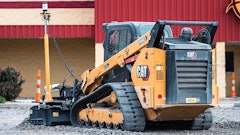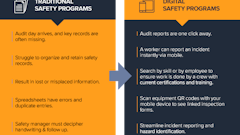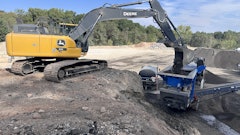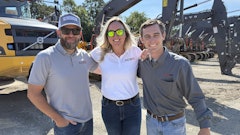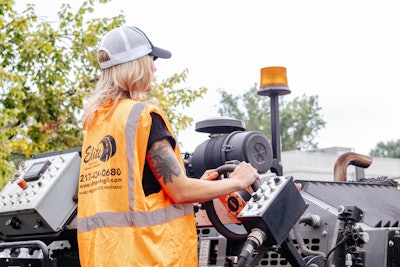
In an industry known for grit, legacy, and tradition, Ali Williams brings something different to the table: perspective. As Business Development Manager for Elite Paving, she doesn’t just help grow the company’s client base — she’s helping to reshape how the asphalt industry presents itself, both to potential customers and future workers.
Williams is part of a new generation of construction professionals who didn’t come up through the trades but found their way in through other strengths — strategy, storytelling and a drive to build something that lasts. While her role at Elite technically centers on business development, her actual scope goes much further.
“I’m the problem solver, the organizer and the person the team comes to when something needs to get done quickly and efficiently,” she said.
Her daily work blends external relationship building with internal brand development — identifying growth opportunities, reconnecting with past clients and creating content that keeps Elite top of mind in a competitive paving market. From generating new business to tightening internal systems, Williams is working to future-proof the company’s presence in a rapidly changing industry.
“I’m always looking for opportunities to elevate our presence and stay competitive,” she said. “And I take pride in making sure our team stays sharp, responsive and visible.”
A New Lens On A Legacy Industry
While asphalt may be one of the most established trades in infrastructure, it’s not immune to disruption. Contractors across the country are navigating labor shortages, aging workforces, tighter bid margins and growing demand for project transparency. At the same time, customers expect a higher level of professionalism and digital savvy.
Williams sees all of that not as a challenge, but an opening.
“I see myself as someone who helps shift the perception of what this industry can look like,” she said.
That includes how asphalt contractors communicate, market themselves and engage new audiences. And it’s not just about flashy branding — it’s about connection, clarity and consistency.
Her approach is shaped by what she didn’t see when she first entered the field: women, young professionals, and creative thinkers who saw value beyond the jobsite. She’s making it part of her mission to change that.
“If I can help create pathways for others to see themselves here, especially women and youth, then I know I’m doing something meaningful,” she said.
Breaking Into The Blacktop
Williams entered the asphalt world less than two years ago, and she’ll be the first to tell you it wasn’t a career she planned for. Introduced to the trades through a professional connection, she was drawn in by the culture, the work ethic, the people and a sense of purpose.
“What surprised me right away was the sense of belonging I felt,” she said. “The people were real, hardworking and passionate about what they do.”
Her background brought a fresh lens to a field that often favors technical experience over communication skills. But Williams saw untapped potential in areas like client outreach, storytelling and strategic branding — tools that could help asphalt companies build lasting trust with both customers and communities.
She also quickly realized the learning curve that came with the job. While she was confident in her business acumen, she knew she had to earn credibility in an industry built on experience. That meant asking questions, staying curious and respecting the knowledge that others brought to the table.
“There’s a learning curve, and I feel it,” she said. “But I’ve learned to lean into curiosity, ask questions, and not be afraid to admit what I don’t yet know.”
Driving Change Where It Matters
Williams’ contributions aren’t just internal. They reflect a broader shift in how construction companies are starting to approach everything from workforce development to customer relationships. Her passion lies in what’s ahead: ensuring that the next generation sees real value in building roads, running crews and being part of the essential work that keeps infrastructure moving.
She’s especially focused on the labor shortage, which she sees as the biggest threat — and the biggest opportunity — for the paving industry today.
“We’re losing experienced workers to retirement, and we’re not replacing them fast enough,” she said. “If we don’t start thinking seriously about how we’re attracting, inspiring, and retaining the next generation, the ripple effect is going to hit every part of our lives.”
That vision has also sparked side projects, including Vintage Blacktop Co., a brand she launched to celebrate the people behind the paving process. Part storytelling platform, part apparel line, the brand offers a way to connect with workers and invite new ones into the fold.
“It’s not just clothing,” she said. “It’s a way to tell the story of this industry through a new lens — one that honors where we’ve been and invites more people to see a future here.”
Purpose In The Pressure
While she acknowledges the unique challenges of being a young woman in a male-dominated field, Williams sees her own leadership style as a strength.
“We process things, communicate, and lead differently than our male counterparts,” she said. “That might’ve been seen as a weakness, but I see it as the future.”
She’s also quick to point out that success in the asphalt industry doesn’t have to follow a single blueprint. Whether you're on a crew, in the office, or working on brand development, there's room for many kinds of contribution.
“There’s no one right way to add value in this industry,” she said. “You just need to be willing to learn, work hard and lead in your own way.”
From navigating complex client expectations to helping Elite Paving modernize how it shows up online, Williams is proving that the future of the asphalt industry isn’t just about equipment or material — it’s about people. And it’s personal.
“If you’re considering it, and you’re willing to take a chance on yourself, this industry can give you more than a job. It can give you a place to grow, contribute and be part of something bigger than yourself.”














